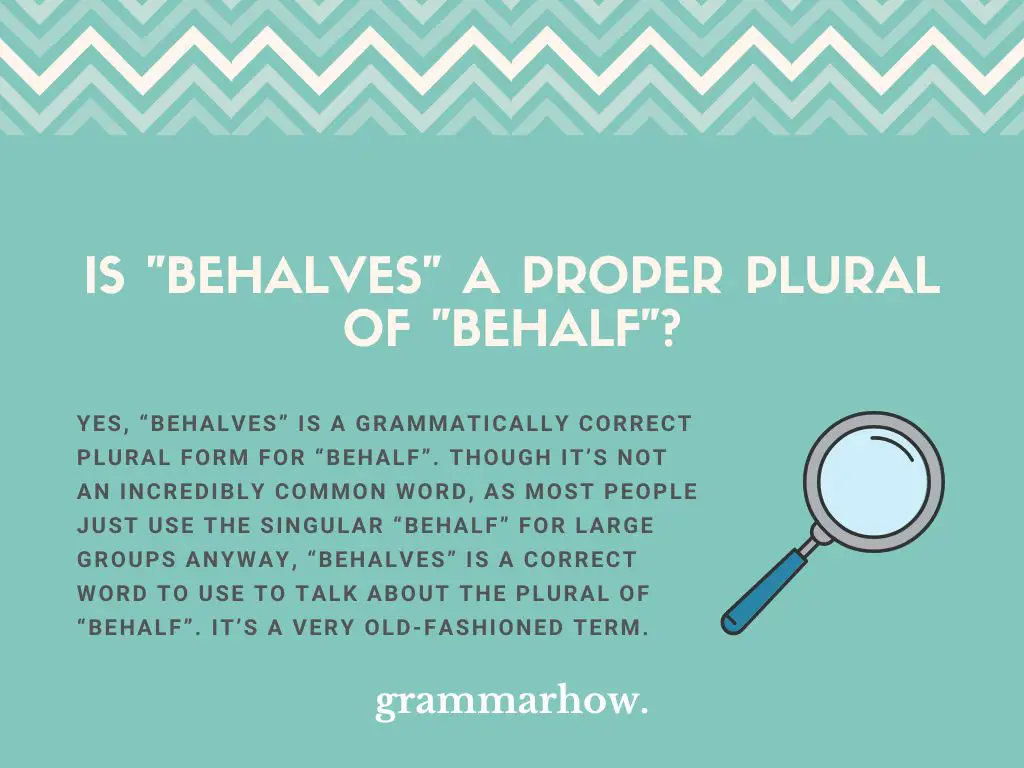Very often in the English language you’ll discover a form of a specific word that you had never seen before. Sometimes these new forms are so odd and unexpected that you’ll wonder if they’re even grammatically correct. This article will answer whether “behalves” is the proper plural form of “behalf”.
Is “Behalves” a Proper Plural of “Behalf”?
Yes, “behalves” is a grammatically correct plural form for “behalf”. Though it’s not an incredibly common word, as most people just use the singular “behalf” for large groups anyway, “behalves” is a correct word to use to talk about the plural of “behalf”. It’s a very old-fashioned term.

You’re perfectly free to use “behalves” as a plural for “behalf” if you wish to, though you should always keep in mind that it will be seen as a very old-school, ornate term to use.
This is the sort of word that used to be significantly more common in use a couple of centuries ago, and can still be found in some uses nowadays, particularly in legal documents.
When to Use “Behalf”
“Behalf” is a word used when talking about how someone is doing something in representation of someone else, or for the benefit of someone else. You can use “behalf” in any context where the action is being performed for someone else.
“Behalf” is a great word to use in any scenario where you want to talk about how a given person is performing an action in representation of another person, who wanted that action to happen.
Here are a few example sentences that include the regular use of “behalf”:
- I’m here on his behalf, to check up on how the production’s running without his direct presence.
- On your behalf I will ask the administration to see if the date can be delayed at all or if it’s set.
- You’ve got to work on my behalf, too, as my lawyer, and I expect you to help me out in the end.
- She’s working on our behalf so I trust that whatever she comes up with will be good for us.
- I’ll work on your behalf without charging you at all, but in return I need you to give me information.
When to Use “Behalves”
“Behalves” is an uncommon plural form for the word “behalf”, and though it has never been particularly popular, it stems from the 18th century or so. You may use “behalves” in situations where you believe that a plural “behalf” is absolutely needed.
Often in English, you can pair “behalf” with a plural expression, by either using “on our behalf” or “on their behalf” or something along those lines.
If you wish to avoid that sort of sentence, you can use “behalves” instead, and have the plural forms all match up without any issues.
Here are some example sentences that will teach you the correct way to use this uncommon word:
- She was working on all of our behalves, and she was the hardest worker I had ever seen.
- I will be working on their behalves, working to protect every single one of their interests.
- If you all want me to, I can work on your behalves, but you have to properly ask for it first.
- I am unbothered by the notion that he’s working on their behalves, quite honestly.
- In the future I will be working on all of your behalves so we should prepare for that moment.
How Common Is the Use of “Behalves”?
According to information sourced by the Google Ngram Viewer, “behalves” has been a very unpopular term since at least the year 1900. The graph allows us to see how the use of “behalf” has grown and decreased over the years in contrast.

Since the year 1900, the use of “behalves” has stayed remarkably consistent, in how unpopular it is. However, “behalves” is recognized as a real word by dictionaries.
Therefore, there hasn’t been a point in history where “behalves” was a popular term. While it is a real word, it’s always been a very uncommon word that doesn’t get much use.
On Our Behalf or On Our Behalves?
While you may freely use both “on our behalf” and “on our behalves” and have them be grammatically correct, we would suggest that you use “on our behalf.” This phrase is very common and people will immediately understand what you mean by it.
The fact that “our” is plural but “behalf” is singular doesn’t particularly matter, because “behalf” gets used for both singular and plural pronouns.
However, if you really want to, you can use “on our behalves”, at the cost of making your phrase slightly more formal and awkward.
- I have good reason to believe that he’s working on our behalf.
- I think she’s going to be working on our behalves.
On Their Behalf or On Their Behalves?
You can use both “on their behalf” or “on their behalves” and guarantee that the sentence stays grammatically correct either way. However, we would encourage you to use “on their behalf”. This phrase is more common and easier to understand.
You can use either the singular “behalf” or the plural “behalves” when it comes to talking about something that is plural, so ultimately it’s up to you.
- She’s working on their behalf right now, we could go and ask her.
- I’ll be working on their behalves for a little while.

Martin holds a Master’s degree in Finance and International Business. He has six years of experience in professional communication with clients, executives, and colleagues. Furthermore, he has teaching experience from Aarhus University. Martin has been featured as an expert in communication and teaching on Forbes and Shopify. Read more about Martin here.
